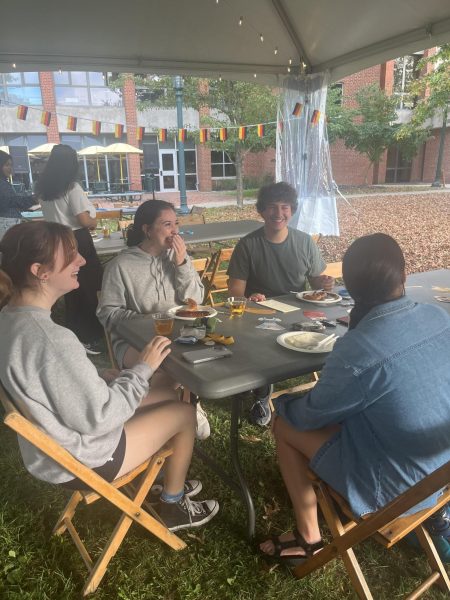Chinese house residents share thoughts on culture
Special interest house engrosses students in Chinese language, environment

Members of the Chinese house enjoy a Hot Pot dinner at North Village I C on Nov. 15, 2019.
The Chinese House is a special interest housing option in the Max Kade International Wing, located in North Village I C. The apartment-style complex is one of six multicultural houses offered at Allegheny College. The remaining five are Arabic, French, German, Spanish and International Houses.
Four students who study Chinese live in this special interest house. The Chinese teaching assistant also lives with the students and is an integral part of the community within the complex. Upon approval, the students are bound by agreements to facilitate an inclusive environment that represents their target language and culture.
“Part of our agreement for living in the house is that we must use Chinese on a day-to-day basis as much as we can,” said Sarah Mayer, ’22. “When we come home, we will speak in Chinese, and, with our day-to-day conversations, we get to practice our language so frequently that (speaking Chinese) helps it to become more natural for us. Because we are all learners, we are all constantly influencing each other and teaching each other new things. Part of the reason why we all get along so well is that we have so much to teach each other about the Chinese language and culture.”
Mayer is an environmental science major and a Chinese language minor. She is a current resident of the Chinese House in the Max Kade International Wing and, Mayer said, intends to use her experiences from the house when she travels abroad to China.
Another resident,Thomas Cassidy, ’21, who is majoring in international studies with a regional focus on East Asia and double minoring in Chinese and computer science, has traveled abroad to China in recent years and hopes to return this summer for an internship.
“I have already traveled abroad to China twice before the summer 2018,” Cassidy said. “I taught English there last spring and about a year ago, I studied in Shanghai.”
Aside from traveling abroad, the residents of the Chinese House strive to enrich the campus community. Last semester, the Chinese House held several events, including authentic cuisine tasting, open houses and movie nights.
“Last semester, we had an international movie night where I played famous Chinese films with the English subtitles to show our culture to (the audience) and let them learn the history about our Chinese background,” said Cindy He, the Chinese teaching assistant for the fall 2019 semester.
An essential aspect of the Chinese House is the emphasis on both the contemporary and historical events in China. This holistic approach to Chinese history enables the students to have an understanding of the past and the events that shaped the present.
“I organized a Hot Pot night, which is a popular food trend in the Southwest providence of China,” He said. “Also, I organized a Foodie Night, where I made popular authentic Chinese dishes. I just wanted them to experience and taste (Chinese) cuisine.”
Changes in the Chinese House occurred at the start of the semester, and Angelica Wang has been appointed as the Chinese teaching assistant for the spring 2020 semester. Wang intends to increase the cultural immersion experience the residents receive by bringing back previous events and celebrating Chinese holidays with the entire campus community.
Due to recent events in China, the first celebration of the new semester, the Spring Festival, otherwise known as the Lunar New Year Festival, was postponed for safety concerns both on campus and in Asia.
“Since the Spring Festival was postponed, I am thinking of holding a small event for the Lantern Festival that celebrates the first Full Moon of the New Year in the Lunar Calendar,” Wang said. “There will probably be rice balls, Chinese food and games that are related to the holiday.”
Concerning the postponement of the Lunar New Year celebration, Wang added that the decision stemmed from prioritizing the health of those who would have attended.
“Before the event, the death rate of the Coronavirus tripled, and the head of the Chinese Department Professor (Xiaoling) Shi, who is from the same city that was shut down, decided to be very cautious about (the virus) and put the students’ and everyone’s health before the event,” Wang said.
The Chinese Department has intentions to reschedule the Lunar New Year Festival, but there have not been any formal announcements regarding the new date.
Despite the setbacks involving the celebratory event, Alec Tolmachoff, ’20, said the house has a strong sense of community is. An environmental science major and a Chinese language minor, Tolmachoff has travelled to China and lived in the Chinese House for the last three consecutive semesters.
“Everyone is there because they want to learn a new language and experience a different culture than the American one that most of us are immersed in,” Tolmachoff said. “Everyone is willing to do something out of their comfort zone (or) within.It is a great community, probably better than any other community that I have been in.”








